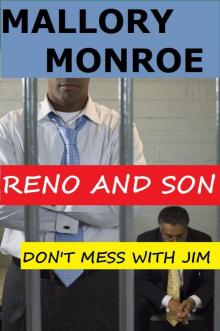- Home
- Mallory Monroe
DUTCH AND GINA: A SCANDAL IS BORN
DUTCH AND GINA: A SCANDAL IS BORN Read online
DUTCH AND GINA
A SCANDAL IS BORN
MALLORY MONROE
c2012
All rights reserved. Any use of the materials contained in this book without the expressed written consent of the author and/or her affiliates, is strictly prohibited.
AUSTIN BROOK PUBLISHING
This novel is a work of fiction. All characters are fictitious. Any similarities to anyone living or dead are completely accidental. The specific mention of known places or venues are not meant to be exact replicas of those places, but are purposely embellished or imagined for the story’s sake.
MORE INTERRACIAL ROMANCE
FROM BESTSELLING AUTHOR
MALLORY MONROE:
THE PRESIDENT’S GIRLFRIEND 2:
HIS WOMEN AND HIS WIFE
THE PRESIDENT’S GIRLFRIEND
MOB BOSS 2:
THE HEART OF THE MATTER
ROMANCING THE MOB BOSS
ROMANCING HER PROTECTOR
ROMANCING THE BULLDOG
IF YOU WANTED THE MOON
AND
FROM BESTSELLING AUTHOR
KATHERINE CACHITORIE:
LOVING THE HEAD MAN
SOME CAME DESPERATE: A LOVE SAGA
WHEN WE GET MARRIED
ADDITIONAL
BESTSELLING
INTERRACIAL ROMANCE:
A SPECIAL RELATIONSHIP
YVONNE THOMAS
AND
BACK TO HONOR:
A REGGIE REYNOLDS
ROMANTIC MYSTERY
JT WATSON
COMING SOON
MORE INTERRACIAL ROMANCE
FROM
MALLORY MONROE:
DUTCH AND GINA 4:
AFTER THE FALL
ALSO ROMANTIC FICTION
FROM
AWARD-WINNING
AND
BESTSELLING AUTHOR
TERESA MCCLAIN-WATSON:
AFTER WHAT YOU DID
STAY IN MY CORNER
DINO AND NIKKI:
AFTER REDEMPTION
Visit
www.austinbrookpublishing.com
for more information
on all romance titles
ONE
As soon as the First Lady cut the ribbon at the new battered women’s shelter in southeast Washington and the small crowd of employees began applauding, the even smaller contingent of reporters assigned to follow her began hurling questions. Only the questions weren’t about the ceremony, or the shelter, but about Dutch and Gina’s two month old baby boy.
“Mrs. Harber,” one of the reporters shouted before the crowd could even stop applauding, “why are you hiding your baby from the American people?”
At first Gina continued to smile. It had been a long road for the shelter and she was happy for them now that their big day had arrived. But when she realized what the reporter had actually asked, she was unable to hide her puzzlement.
“Excuse me?” she asked the reporter, her hand straightening the African-styled bracelets on her wrist. Why was she “hiding” her baby? Why in the world, she wanted to know, would he make such an odd accusation?
But the reporter wasn’t about to back down. He knew his accusatory question would get a reaction out of her, it would have been political suicide if she hadn’t responded, and that was exactly why he asked it.
“Why are you hiding your baby from the American people?” he asked again. “Since the day he left that hospital in Newark and the president had him so wrapped up that we couldn’t get a good look at him, there’s been no video or even a photo released. Don’t you think the American people deserve to see the First Child?”
“No, I do not think anybody deserves to see my child,” Gina said, barely able to shield her contempt.
The two members of her staff accompanying her, Loretta “LaLa” King and Christian Bale, looked warily at each other, both wondering how in the world could they initiate preemptive damage control before any real damage could be done.
And the reporter continued to hammer away. “So what you’re saying, ma’am, is that you don’t believe the American people are deserving?”
“Don’t entertain them, G,” LaLa, who also happened to be the First Lady’s best friend, whispered in her ear.
“What I’m saying,” Gina said, unable to back down from any challenge, “is that our child has nothing to do with the American people.”
“But how can you say that, Mrs. Harber? You, your husband, and that child are the First Family. The American people have a right to know everything there is to know about the First Family.”
“The president signed up for this,” Gina made clear. “By marrying him I signed up for this. But our child didn’t sign up for any of this. Next question?” Her big brown eyes began looking beyond the reporter for a different journalist who wanted to ask, she prayed, a completely different question.
“But don’t you think that’s the point, Mrs. Harber?” the same reporter managed to ask. “Because you and your husband decided to become a political family, your child is a story whether you like it or not. And you and the president should bring him out so the American people can get a good look at him.”
“We disagree with you,” Gina said firmly, to end it. “Next question?”
The next question did indeed come, and from a different reporter, but as soon as it was asked Gina, LaLa and Christian all knew that it, not the ribbon cutting ceremony nor any of the previous questions, would be the lead story on every nightly newscast.
“Isn’t it true, Mrs. Harber,” the reporter asked, “that the president isn’t your baby’s daddy, after all, but your baby is really Roman Wilkes’ child? Isn’t that why you’re hiding that baby from the American people?”
It was so loaded with such an over-the-top accusation that Gina couldn’t help but laugh and shake her head. These people crazy, she said to herself.
“Yeah,” she said aloud, her voice dripping with disdain, “that’s the reason. You’ve really got me now. You’ve figured it all out. The whole scheme.”
Even LaLa had to smile at that one. That’s how you handle jerks like these, she wanted to tell the First Lady. Some of the reporters even laughed at the joke too. But just in case there were more questions to come of that same silly variety, LaLa and Christian didn’t take any chances.
“Thank-you all very much,” LaLa said to the reporters as she and young Christian turned Gina away from the DC press corps and back to the shelter employees, none of whom had accusatory questions to ask; all of whom were thrilled to death to be in the presence of the First Lady of the United States.
***
The President of the United States, Walter “Dutch” Harber, and his point person on immigration, former Florida Senator Crader McKenzie, stood near the Rotunda on Capitol Hill and shook hands with the Speaker of the House of Representatives. It was to be nothing more than a photo-op after a long and contentious meeting, with all three men vowing to work together to ensure passage of some form of comprehensive immigration reform. They also vowed to keep their disagreements to a minimum.
“We have work to do on behalf of the American people,” Jed Brightman, the Speaker of the House, said. “We don’t have time for games.”
Dutch found it a little off-putting that the Speaker would make such a comment, since he and a small group of more conservative, blue-dog democrats like him were the ones holding up reform legislation to begin with, but he smiled anyway, shook the Speaker’s hand with the cameras clicking, and then agreed to take a few questions on the bill itself, or any other related issue.
Of course the DC press corps always exercised their freedom of the press and rarely asked what was expec
ted of them. This evening on Capitol Hill was no exception.
The questioner wasted no time. “What is your response, sir,” she asked, “to the explosive allegations involving the First Lady and famed Defense Attorney Roman Wilkes?”
It was an odd question to say the least, and most people would have asked for clarification, but Dutch was an old hand at DC-styled gotcha games and therefore kept his cool. He stood there tall and elegant, his hands in the pants pockets of his tailored-to-perfection suit, his intelligent green eyes sharp and focused as he stared out at the red-meat press. He had no clue what that reporter was referencing, but he also wasn’t about to rise to her obvious bait.
“The reason I’m here,” he said, “is to ensure that Congress gives due-diligence to my upcoming White House conference on immigration reform. It’s a priority of my administration and that’s why I asked my old friend, former Senator Crader McKenzie, to act as my surrogate on this vital matter. And now that we’ve met with Speaker Brightman, Senator McKenzie and I are pleased that the Speaker has committed to join us for this grand undertaking. It’s long overdue and the Congressional Hispanic Caucus is right: we can’t wait any longer.”
“But what about the First Lady, sir?” another reporter shouted out. “She admitted that Roman Wilkes, her former lover, is the father of her child. She admitted that you are not the father. Can you comment on that, sir?”
Dutch was so thrown by the allegation that for the first time in a long time he literally didn’t know what to say. Was this some kind of sick joke? He knew it had to be, on every level he knew it had to be, but how could they have even invented such a tale?
“Thank-you, Mr. President!” Allison Shearer, the president’s press secretary, nervously shouted out in the customary way of ending the reporters’ access. Dutch and Crader McKenzie were then ushered away by staffers.
Both men slid into the awaiting presidential limo with a kind of bewildered, what was that about look on their faces. Allison slid in also and sat on the opposite seat. She had two cell phones in her hands as she frantically tried to get more intel. Max Brennan, the president’s chief of staff and his best friend since childhood, was already seated in the limo, opposite Dutch and Crader, trying frantically too.
When Max finally got off of the phone, he was shaking his head. “Why does she keep doing this?” he wanted to know.
“What’s happened?” Dutch asked.
“There was no live feed at the ribbon cutting ceremony she attended today, and they don’t have the recorded tape yet, but the buzz is all over cable news.”
“And what buzz is that?” Dutch was trying his best to keep it together.
Max let out a harsh exhale. “Apparently a reporter asked the First Lady if Roman Wilkes was the father of her baby boy. And she, according to press reports, said yes.”
“Bullshit!” Dutch said pointblank.
“That’s according to press reports, Dutch,” Max said. “I’m just telling you what every cable news channel is reporting right now. You know how out there Gina can be.”
Crader McKenzie looked at Max. Crader was a no-nonsense tough guy around the president’s age who didn’t mince words; an average-height, muscularly-built man with brownish-blonde hair, movie star good looks, and piercing blue eyes that brook no debate. He was a hard charger to his core who hailed from the rougher dens of America rather than those polite, New England, old money parlors and morning rooms from Dutch and Max’s past.
And a man like Crader was never comfortable with the liberties a man like Max took with the president. He knew the president and Max were childhood best friends and had that old connection going strong, but right was right in Crader’s eyes. And some flunky from way back like Max Brennan was all wrong.
“What’s that supposed to mean?” he asked the chief of staff. “Where do you get off speaking in such a negative way about our First Lady?”
“I don’t mean any disrespect,” Max prefaced his comments, “and the president knows I don’t. But his wife is very out-spoken and oftentimes she’ll mix it up with the press when it’s advisable not to. And in my view she has been around here long enough to understand that.”
“That’s not for you to determine,” Crader made clear. “Who the hell cares about your view? You’re just the help. Dutch is the President of the United States. He’s the man in charge, not you. It’s none of your gotdamn business how his wife is or what she’s prone to do or not do, that has nothing to do with you.”
“What are you jumping all over me for?” Max asked, equal parts embarrassed and angry. “I was just stating facts.”
“Then keep your facts to yourself. Dutch doesn’t need to hear’em. He knows his wife better than you’ll ever know her, so shut the fuck up and just do your job. And nowhere in your job description does it give you the license to speak derisively about the First Lady of the United States.”
Max had heard how Crader McKenzie was a bulldog; a man who didn’t know what finesse and diplomacy meant. And for that very reason many staffers, including Max, were opposed to Dutch’s selection of him as his point person on immigration. But Dutch was firm. He needed somebody who could stand toe-to-toe with that wayward Congress and the powerful Speaker of the House, and Crader was the only man he knew capable of fitting that bill.
But right now, Dutch had Gina on his mind. He leaned back and ignored the back and forth between Crader and Max. He was too busy praying that those vultures in the DC press corps didn’t drag his wife into yet another one of their sick, perverted games where twisting people’s words to fit some sound-bite narrative was their one and only goal. He didn’t even want to see it on TV. He didn’t want to hear any staffer give him a blow-by-blow. He wanted to hear it from Gina. He wanted Gina.
TWO
“It’s not true, Dutch,” Gina said as soon as the president arrived at the White House and made his way into the second floor Residence. She had been staring out of the lunette window within the West Sitting Hall, unable to remain still, when she saw him walking in.
Her expressive, flustered face, with its smooth-as-silk dark brown skin and that worried, almost distressed look in her big, brown eyes, broke his heart.
There she stood, in her smart skirt suit and heels, her curvaceous body straight and tall with African braids dropped along her back, her arms folded across her busty chest in what Dutch could only imagine was a defensive pose. As if she wanted desperately to shield herself from the onslaught.
She was a wonderful lady with a big heart, Dutch thought as he looked at her. Yet he’d never known another human being who had to endure such harsh, unfair treatment. He knew it was mainly because she was his wife and his political enemies would stop at nothing to discredit him. But he also knew it was because she stood her ground; because she refused to let them continually piss on her and call it rain; because she wasn’t interested in giving up who she was for what they wanted her to be.
LaLa was also in the West Sitting Hall, a room which, for all intents and purposes, was the First Family’s informal livingroom. LaLa was seated on the couch holding in her arms little Walter Robert Harber, Jr, or Little Walt as Dutch and Gina ended up calling their baby boy. She stood to her feet when the president walked in.
“I’ll go give him back to Nurse Riley,” LaLa said, certain the couple wanted to talk privately given the events of the day, but Dutch walked up to his son.
“Hey, little fellar,” he said with a smile, and gladly took him from LaLa’s arms. LaLa smiled.
The baby grinned with unbridled joy and started wiggling with excitement at the sight of his father; at that sweet cologne smell he now knew so well; at the warmth of his father’s big, powerful arms.
“How have you been, precious one?” Dutch said, his heart so filled with love he could hardly contain it. He never dreamed he’d be the father of a child. Other than Caroline Parker, his former fiancée, he never wanted any of the women he fooled around with to have any child of his.
Until
he met Gina.
He wiggled his child’s buttonish nose. “How is my little blessed one doing on this glorious day the Lord has made?”
Gina, too, was always overcome with emotion whenever Dutch held their son. It was as if their father-and-son bond was so strong that she just knew it would never be broken. Usually it was the mother that bonded first, but not where their Little Walt was concerned. He was a daddy’s boy from the day he careened out. And for that press to take something so pure and beautiful and turn it into a cheap, made-for-TV scandal was unconscionable to her. She was as angry as she was hurt.
Dutch, forgetting that LaLa had offered to take the child to the Nursery, took the child to the Nursery himself, talking sweet, happy talk to him as they went.
LaLa looked at Gina and shook her head. “That little black boy is going to be one spoiled Negro when his daddy gets through with him,” LaLa said with a laugh.
Gina smiled too. LaLa always reminded her of Phaedra from that Real Housewives of Atlanta TV show, not just in appearance, although they favored heavily, but especially in the way she phrased her words. A little sass, but lots of southern in her phraseology.
LaLa, however, who had been told by more people than she cared to count that she favored and acted like Phaedra the lawyer from that Atlanta Housewives show, kept on talking anyway. “He loves that boy to death,” she continued. “Loves you too, girl, although I’m not sure which one of you he loves the most. And that’s saying something.”
Gina smiled. To have a man who loved her child more than anything else on the face of this earth was a God-sent to her. That was what she wanted. That was what she always dreamed would happen.
Besides, she thought, she knew her value to Dutch Harber. And it would indeed take something as remarkable as the birth of a wondrous baby boy to dethrone her reign as number one in his heart.

 Alex Drakos: For My Lover
Alex Drakos: For My Lover Reno Gabrini: The Trouble with Dommi
Reno Gabrini: The Trouble with Dommi Reno Gabrini- the Trouble With Dommi
Reno Gabrini- the Trouble With Dommi Tommy Gabrini: A Family Man
Tommy Gabrini: A Family Man Reno Gabrini: Turn Back Time
Reno Gabrini: Turn Back Time Monk Paletti: Taming Ashley Sinatra
Monk Paletti: Taming Ashley Sinatra Mick Sinatra: Ice Cold Love
Mick Sinatra: Ice Cold Love The President's Boyfriend
The President's Boyfriend Mick Sinatra: Needing Her Again
Mick Sinatra: Needing Her Again Oz Drakos: Loving Mick the Tick's Daughter
Oz Drakos: Loving Mick the Tick's Daughter Trevor Reese: His Protective Love
Trevor Reese: His Protective Love Bobby Sinatra: In All the Wrong Places (The Rags to Romance Series Book 1)
Bobby Sinatra: In All the Wrong Places (The Rags to Romance Series Book 1) Plain Jane Evans and the Billionaire
Plain Jane Evans and the Billionaire Amelia Sinatra: What Hammer Wants
Amelia Sinatra: What Hammer Wants Teddy Sinatra_Chains For Love
Teddy Sinatra_Chains For Love Mick Sinatra: No Love. No Peace. (The Mick Sinatra Series Book 9)
Mick Sinatra: No Love. No Peace. (The Mick Sinatra Series Book 9) Her Protector
Her Protector Reno Gabrini- the Man in the Mirror
Reno Gabrini- the Man in the Mirror Reno Gabrini: When His Woman Cries
Reno Gabrini: When His Woman Cries Reno and Trina: In the Shadows of Love, Book 12
Reno and Trina: In the Shadows of Love, Book 12 Alex Drakos 3_What They Did For Love
Alex Drakos 3_What They Did For Love Sal Gabrini: Love And War
Sal Gabrini: Love And War Brent Sinatra: All of Me
Brent Sinatra: All of Me Until You Come Back To Me, Book 5
Until You Come Back To Me, Book 5 Reno and Sal Gabrini: Fire with Fire
Reno and Sal Gabrini: Fire with Fire Mick Sinatra: Breaking My Heart
Mick Sinatra: Breaking My Heart DUTCH AND GINA: A SCANDAL IS BORN
DUTCH AND GINA: A SCANDAL IS BORN Romancing Her Protector
Romancing Her Protector Mick Sinatra 2: Love, Lies, and Jericho
Mick Sinatra 2: Love, Lies, and Jericho Sal Gabrini: Just The Way You Are
Sal Gabrini: Just The Way You Are Tommy Gabrini 4: Dapper Tom Begin Again
Tommy Gabrini 4: Dapper Tom Begin Again Alex Drakos_His Dangerous Affair
Alex Drakos_His Dangerous Affair Tommy Gabrini: Every Which Way But Loose
Tommy Gabrini: Every Which Way But Loose Mick Sinatra 3: His Lady, His Children, and Sal
Mick Sinatra 3: His Lady, His Children, and Sal Romancing Sal Gabrini 2: A Woman's Touch
Romancing Sal Gabrini 2: A Woman's Touch Reno Gabrini: A Man in Full
Reno Gabrini: A Man in Full Big Daddy Sinatra_Bringing Down the Hammer
Big Daddy Sinatra_Bringing Down the Hammer MOB BOSS 3: LOVE AND RETRIBUTION
MOB BOSS 3: LOVE AND RETRIBUTION Amelia Sinatra: Hammer Time
Amelia Sinatra: Hammer Time Reno Gabrini: A Family Affair
Reno Gabrini: A Family Affair DUTCH AND GINA: THE SINS OF THE FATHERS
DUTCH AND GINA: THE SINS OF THE FATHERS Big Daddy Sinatra: Papa Don't Play
Big Daddy Sinatra: Papa Don't Play Mick Sinatra: The Harder They Fall
Mick Sinatra: The Harder They Fall Alex Drakos: Branding Her Again
Alex Drakos: Branding Her Again Sal Gabrini 3: Hard Love
Sal Gabrini 3: Hard Love Sal Gabrini: His House of Cards
Sal Gabrini: His House of Cards Mick Sinatra 4: If You Don't Know Me by Now
Mick Sinatra 4: If You Don't Know Me by Now Sal Gabrini: Burning Love
Sal Gabrini: Burning Love For the Love of Gina: The President's Girlfriend
For the Love of Gina: The President's Girlfriend Mick Sinatra: Love and Shadows
Mick Sinatra: Love and Shadows ROMANCING TOMMY GABRINI
ROMANCING TOMMY GABRINI Mick Sinatra: Now Will You Weep
Mick Sinatra: Now Will You Weep Reno and Son: Don't Mess with Jim (The Mob Boss Series)
Reno and Son: Don't Mess with Jim (The Mob Boss Series) Reno Gabrini: For His Lover (The Mob Boss Series Book 14)
Reno Gabrini: For His Lover (The Mob Boss Series Book 14) Trevor Reese: His Secret Love
Trevor Reese: His Secret Love BIG DADDY SINATRA 2: IF I CAN'T HAVE YOU, Book 2
BIG DADDY SINATRA 2: IF I CAN'T HAVE YOU, Book 2 Alex Drakos: His Dangerous Affair (The Alex Drakos Romantic Suspense Series Book 4)
Alex Drakos: His Dangerous Affair (The Alex Drakos Romantic Suspense Series Book 4) Romancing the Bulldog
Romancing the Bulldog Alex Drakos_His Forbidden Love
Alex Drakos_His Forbidden Love RENO AND TRINA: GETTING BACK TO LOVE (The Mob Boss Series)
RENO AND TRINA: GETTING BACK TO LOVE (The Mob Boss Series) Dutch and Gina: The Power of Love
Dutch and Gina: The Power of Love Big Daddy Sinatra: Carly's Cry
Big Daddy Sinatra: Carly's Cry Sal Gabrini 4: I'll Take You There (The Gabrini Men Series Book 7)
Sal Gabrini 4: I'll Take You There (The Gabrini Men Series Book 7) Big Daddy Sinatra: Charles In Charge (Big Daddy Sinatra Series Book 6)
Big Daddy Sinatra: Charles In Charge (Big Daddy Sinatra Series Book 6) Tommy Gabrini: The Grace Factor
Tommy Gabrini: The Grace Factor Mick Sinatra: For Once In My Life
Mick Sinatra: For Once In My Life Mob Boss Eleven- The Wrong One (The Mob Boss Series Book 11)
Mob Boss Eleven- The Wrong One (The Mob Boss Series Book 11) Alex Drakos: His Forbidden Love
Alex Drakos: His Forbidden Love Alex Drakos 2_His Scandalous Family
Alex Drakos 2_His Scandalous Family Reno Gabrini: I'm Losing You
Reno Gabrini: I'm Losing You